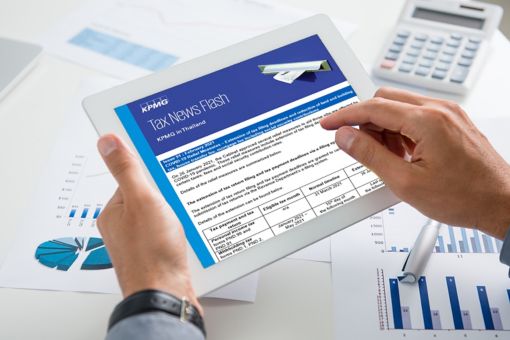E-commerce tax – the Government’s response on the public hearing on the third draft law
Tax & Legal News Flash Issue 68
The Thai Revenue Department (TRD) has issued its comments addressing key issues raised by potentially impacted foreign e-commerce operators and platforms during the third public hearing that was conducted in early January 2020 on the third draft of the proposed e-commerce indirect tax law.

In a nutshell
Briefly, the third draft of the e-commerce legislative amendments that was released on 14 January 2020 proposed that a foreign company providing electronic services to a non-VAT registered person, and where the services are used in Thailand, must register and will be subject to 7% VAT in Thailand if its annual VAT-able income exceeds Thai Baht 1.8 million. This rule also applies to the owner of electronic platforms that are used by the said foreign companies to provide electronic services. Please refer to our previous Tax & Legal News Flash on this topic here.
Although the third draft of the law provided some clarity, certain concerns raised in the second public hearing, specifically regarding the practical application and certain compliance obligations to be imposed on foreign operators and platforms remained unclear.
During the public hearing on the third draft of the law that was open until 29 January 2020, some potentially impacted foreign e-commerce operators and platforms submitted their comments online to the Thai government raising some of these issues for the TRD’s consideration. The TRD also initiated and hosted several face-to-face meetings with some foreign e-commerce operators and platforms to discuss the draft and receive their feedback. The TRD has now published their responses to the comments received from the public.
TRD’s key comments
- The TRD will issue guidelines for tax officers in Thai and English languages to provide interpretation and enforcement protocols. These guidelines are intended to include, amongst other things, the list of activities that fall under the definition of electronic services, clarification of tax base, and foreign exchange conversion for VAT computation purposes and VAT payment. Furthermore, the TRD will consider providing channel for taxpayers to contact the TRD directly in case there are any enquiries on the new law.
- The participants suggested that the definition of electronic services should give regard to ‘minimum human intervention’. The TRD acknowledged the suggestion and will consider the minimum human intervention as one of the factors when determining the list of activities that fall under the definition of electronic services.
- The TRD did not provide specific guidance on how to determine VAT registered status of the service recipients or whether the affected foreign operators and platforms will have an obligation to verify the VAT ID number provided by the service recipients. Instead, the TRD suggested that the foreign operators and platforms should adopt an ‘appropriate method’ to confirm whether its customers are a VAT registrant.
- The participants questioned whether the registration for VAT under the proposed e-commerce law will trigger the creation of permanent establishment that will be subject to income tax. The TRD responded that the proposed e-commerce law will not relate to income tax as it will only amend relevant VAT provisions.
- The participants suggested that quarterly, semi-annual or annual filing of VAT return should apply to the VAT return submission under the proposed e-commerce law in order to ease compliance burden on foreign operators and platforms that do not have a physical presence in Thailand. Unfortunately, the TRD confirmed that the VAT return filing will be on a monthly basis, in line with the rules applicable to Thai VAT registrants. The deadline for a monthly VAT return filing will by the 15th day of the following tax month.
- The foreign operators and platforms should be able to request a VAT refund in case of excess VAT payment but will not be allowed to utilize the excess VAT payment against the following month’s VAT payable.
- The participants also suggested that the enforcement of the proposed e-commerce law, i.e. VAT return filing and VAT payment, should be extended further, for at least 12-18 months, to facilitate foreign operators and platforms in the development of their systems to support the compliance with the law. The TRD acknowledged the suggestion and will consider it.
- There is no indicated timeline for the enactment of the proposed e-commerce law.
KPMG observations
As several elements of the proposed e-commerce law including the implementation and compliance obligations are still under consideration and development of the TRD and the relevant authorities, there is no significant clarification provided by the released comments. Further clarifications are expected to be released as guidelines for tax officers after enactment of the proposed e-commerce law.
KPMG is at the forefront of the developments on this subject and will be pleased to discuss the potential impact of these proposed amendments to your business.
Connect with us
- Find office locations kpmg.findOfficeLocations
- kpmg.emailUs
- Social media @ KPMG kpmg.socialMedia


